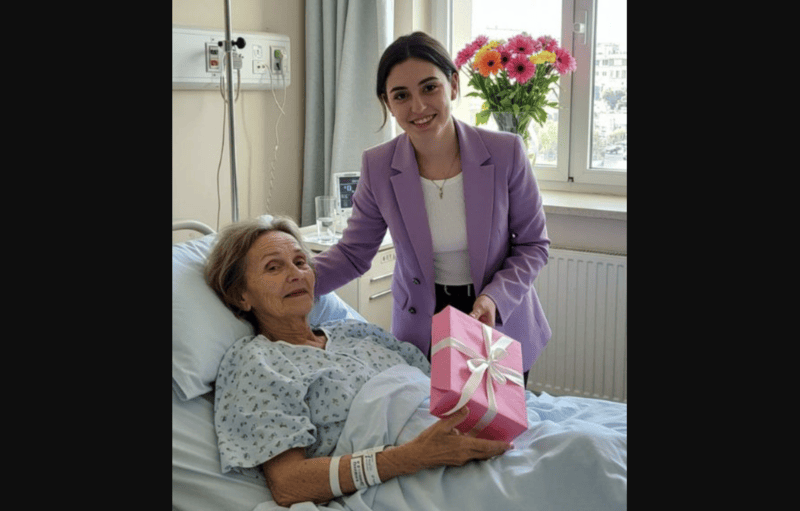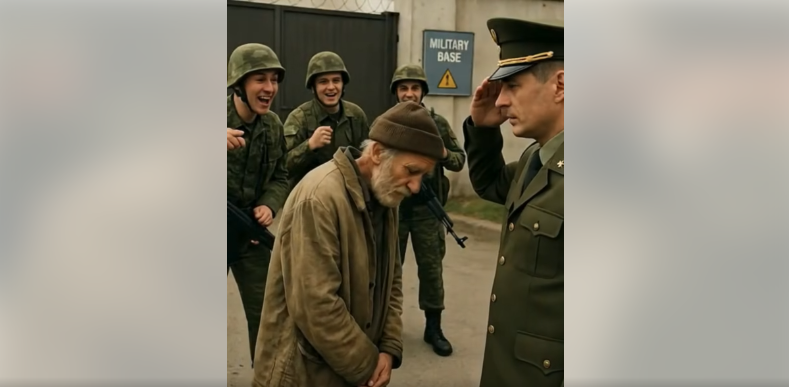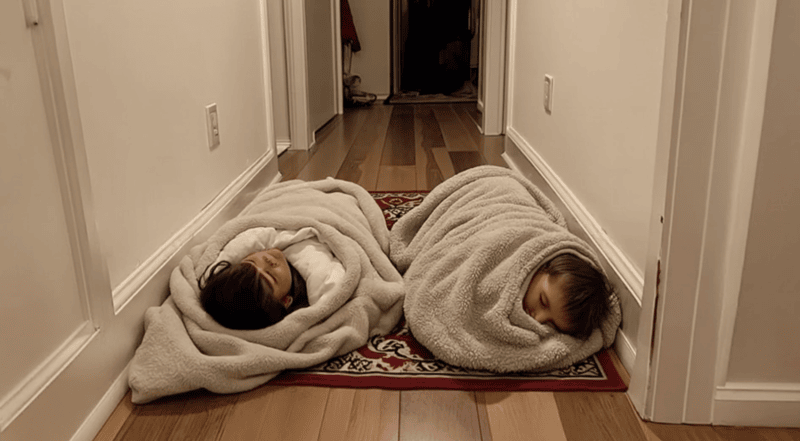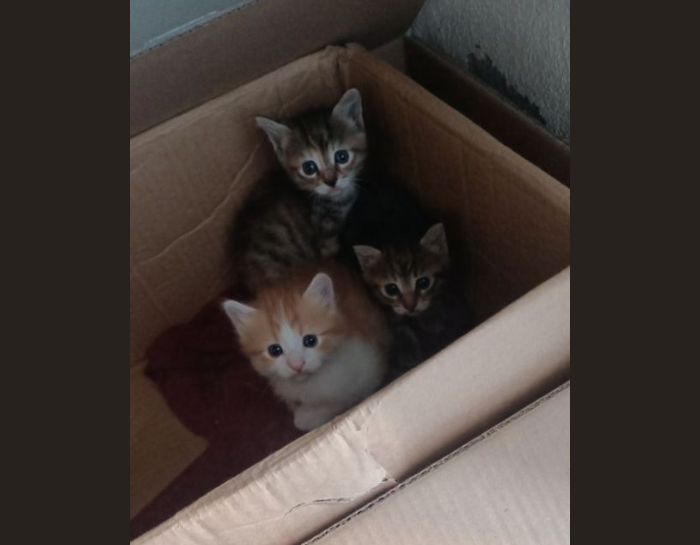Mrs. Lilia had always been affectionately known as “the flower lady” on our block.
She’d famously scold neighborhood kids for daring to step on her delicate violets, generously hand out miniature zucchinis from her bountiful garden, and recount stories about her late husband as if he’d merely stepped out to the corner store.
We had grown remarkably close over the years—she’d offer me tea and a steady stream of unsolicited advice, and I’d dutifully fix her porch light every time it inevitably flickered.
When I heard she’d been urgently taken to the hospital, something tugged sharply at my chest, a deep sense of concern.
Her family was unfortunately out of state, living far away.
No one had seemingly come to visit her in the hospital.
So I quickly grabbed a vibrant bouquet of fresh daisies, wrapped a charmingly silly pink gift box containing lavender lotion and a soft scarf she had once admired, and headed straight over to the hospital.
She looked smaller and more fragile than I remembered her to be—frail, tucked beneath those excessively white hospital sheets with a loose hospital bracelet sliding halfway down her thin wrist.
But when she saw me standing there, her entire face visibly lit up with a radiant joy.
“Oh honey,” she said, her voice weak but warm, patting the bed gently with her thin hand, “you actually came to see me.”
I sat down beside her, trying desperately not to choke up with emotion, handed her the thoughtful gift, and began rambling nervously about how the entire neighborhood was sorely missing her characteristic grumpiness.
But then, just as I leaned in to give her a hug, she looked me directly in the eyes and whispered conspiratorially—
“Promise me you’ll take the box from under the lilac tree… after I’m truly gone.”
My body froze for a second, caught completely off guard.
I tried to force a smile, pretending it was just another one of her quirky old-lady eccentricities, but she wasn’t joking at all.
Her voice trembled with something far deeper than mere physical pain.
It felt distinctly like fear… or an urgent, desperate plea.
“What box, Mrs. Lilia?” I asked gently, holding her hand reassuringly.
“You’ll know it when you see it. Just… don’t open it there at the tree. Take it home with you. Open it alone.”
There was a long, heavy pause, and then she smiled again, as if she hadn’t just uttered something that sent an undeniable chill down my spine.
She then calmly asked about my job, about my cat, Niblet, and whether the new tenants in apartment 3B had properly trimmed the hedge this season.
We talked as if absolutely nothing was wrong, but I couldn’t stop my mind from obsessively thinking about that mysterious box.
She fell asleep mid-sentence, still gripping my hand tightly.
I sat there for another twenty minutes, silently watching her chest gently rise and fall with each breath, then I leaned in, kissed her forehead softly, and whispered, “I’ll find it, Mrs. Lilia.”
That was the very last time I saw her alive.
She passed away peacefully the next morning.
The funeral was a quiet, subdued affair.
Her niece came in from Oregon, a woman I had only met once before, who seemed more preoccupied with her flight home than with Lilia’s beloved garden or her memory.
She asked if I could help sort through some of the belongings in the house, and I immediately said yes, knowing precisely what I needed to look for.
Three days later, I wandered quietly around her backyard in the early morning light, meticulously scanning the ground directly under the lilac tree.
It was hard to miss—a small metal box, heavily rusted at the corners, tucked snugly into the gnarled roots as if it had been intentionally hiding there for years.
I hesitated for a moment, my heart pounding softly.
It felt profoundly wrong to open it right there, exposed to the swirling wind, the chirping birds, and the curious neighborhood kids who had probably already ruined her tulips by now.
So I carefully took it home with me.
The box was surprisingly heavier than I expected.
I placed it gently on my kitchen table, locked the front door securely, and sat down, my anticipation building.
The lid creaked open slowly, revealing its secrets.
Inside, there were exactly three items: a sealed, aged envelope, a faded black-and-white photograph, and a small, delicate velvet pouch.
I picked up the photograph first.
It depicted a man I’d never seen before—tall, with dark hair, standing intimately next to Lilia in front of a distinct green car.
Her smile in the picture was unlike anything I had ever witnessed in real life—wide, wild, and radiating pure, unadulterated happiness. She looked incredibly young and utterly free.
The envelope had my name clearly written on it.
I opened it with shaking hands, my breath held.
My dear,
If you’re reading this, then I’m gone, and you’ve bravely done what I never had the courage to do—open the box that held the truth I buried deep with the lilacs. I didn’t want to take this secret with me, but I honestly didn’t know who I could possibly trust with it. Until you, my dear.
The man in the photo isn’t my late husband. His name was Eli. He was truly the love of my life, my entire world.
We met in 1954, a magical time. I was engaged to Tom, my late husband, but Eli… he showed me a vibrant version of life I never thought was meant for girls like me. We shared one perfect summer before he left to “make things right” back home in his life.
He never returned to me.
By the time I heard from him again—two agonizing years later—I was already married to Tom. The letter he sent me is carefully tucked inside this velvet pouch. I never replied to him. I simply didn’t have the courage to do so.
I kept this profound secret my entire life. Not because I was truly ashamed, but because no one ever truly asked me about it. You’re the very first person who ever made me feel like I wasn’t just some grumpy old woman perpetually carrying a watering can.
Burn the letter, if you wish. Or read it, if you dare. I trust your heart infinitely more than I ever trusted my own.
My throat tightened, a lump forming, as I sat back in my chair, blinking back the hot tears that threatened to fall.
I then carefully opened the small velvet pouch.
Inside was an old, delicate piece of paper, folded precisely.
Eli’s handwriting was careful and precise, a little faded with time, but still perfectly readable.
My dearest Lilia,
I made a terrible mistake, my love. I should have stayed with you. I let fear win, and I’ve regretted it every single day since then. I know you’re probably married now, perhaps even with children. I’m not writing this to change your life or disrupt your happiness. I just desperately want you to know that you irrevocably changed mine. You were my profound peace. My wild, beautiful wildflower. I still drive past that diner where you famously spilled coffee on me. I still vividly imagine your wonderful laugh. If there’s even a tiny part of your heart that misses me, please, write back. I’ll wait for you.
Always,
Eli
I sat at the kitchen table for what felt like endless hours, the words echoing in my mind.
She never replied to him.
It broke my heart in ways I hadn’t anticipated. Not just for the profound love she had clearly lost, but for the vibrant life she might have had with him.
And for all the times I had seen her watering her roses, humming softly to herself, wondering what deeply buried memories lay hidden deeper than her tulip bulbs.
I decided not to burn the letter as she suggested.
Instead, I found an old journal of mine and carefully taped the letter inside the front cover.
Her story didn’t deserve to be erased by fire. It deserved to be remembered, cherished, and shared.
A week passed quickly. I helped her niece diligently pack up the house, item by item.
Most of her belongings were either sold or generously given away, but I kept a single, cherished flowerpot from her windowsill and the soft scarf I had gifted her.
It wasn’t until many months later that the real, unexpected twist finally came to light.
I was having dinner with a close friend of mine, Marcus, who surprisingly worked at the DMV, of all places.
I casually mentioned Lilia’s distinct green car from the photograph, just offhand, and showed him the picture I had carefully kept.
His eyes immediately narrowed in recognition.
“I’ve definitely seen this guy before,” he stated, a serious tone in his voice.
I initially thought he was joking with me, but he wasn’t at all.
Marcus then pulled out an old, dusty folder he’d accidentally taken home—it contained documents from a classic car auction that had taken place ten years ago.
There it was, unmistakably.
The very same green car.
It had been sold by a man named Elijah Morris. No middle name was listed.
Just a small, handwritten note scribbled in the corner: “Donating proceeds to a women’s shelter in honor of ‘L’.”
I felt the wind completely knocked out of me, breathless.
He hadn’t forgotten her.
He hadn’t moved on completely from her.
In his own quiet, profound way, he’d loved her faithfully to the very end of his days.
I went home that night, took out the photograph again, and whispered softly, “He kept his promise, Lilia.”
And then I knew precisely what I had to do next.
With her niece’s gracious permission, I planted a second lilac tree in her backyard.
Right next to the first, as a symbol of enduring love.
I carefully placed a small, smooth stone at its base, exquisitely engraved with words I knew Lilia would never have said aloud, but probably thought every single time she walked beneath its fragrant branches:
“Once, I loved. And it loved me back.”
That fall, something truly strange and wonderful happened.
A young couple moved into Lilia’s old house. Sweet, vibrant people in their early 30s, with two lively kids and a loud, playful dog.
On a random Tuesday afternoon, the woman knocked on my door, holding a small, unassuming box in her hands.
“Hi,” she began apologetically, “sorry to bother you, but this was found in the attic. It apparently has your name on it.”
I opened it slowly, my heart thumping with anticipation.
Inside was another sealed envelope.
Thought I’d keep you busy, my dear. The attic always held better secrets than the garden ever did.
With love,
L.
Inside the box were old, cherished recipes, weathered newspaper clippings of gardening tips, and a worn journal.
Her journal.
It contained intimate entries from the exact year she had met Eli.
She wrote about him in ways I hadn’t thought possible for someone so outwardly guarded and reserved.
Every single page felt like a new window opening into a profound part of her soul I had only briefly glimpsed at her bedside in the hospital.
I decided then and there to do something I had never remotely imagined doing.
I transformed her deeply personal story into an online blog.
Not a sensationalist one, just a soft, quiet, intimate place online where I shared her poignant words, her hidden love story, her practical garden tips, and all the little moments she believed no one ever truly noticed.
It started with only ten faithful readers.
Then it grew to a hundred.
By spring, I was receiving heartfelt messages from people across the entire country.
People who remembered their own “Eli.”
Their own “Lilia.”
Some who were young and deeply scared to take a chance on love, others who were much older and still wondering what if they had made different choices.
It became far more than just a simple tribute.
It became a powerful reminder.
That it’s never too late to bravely tell your own story.
Never too late to profoundly matter to someone else.
And never, ever too late to love—even if it’s only through cherished memories and the enduring beauty of lilac trees.
Sometimes, the people who change your life most profoundly are the ones you least expect to.
A quiet neighbor.
A fleeting stranger.
A flower lady with long-buried secrets tucked away in a rusted box beneath a tree.
Lilia never traveled far from her home. She never wrote a published book. She never even owned a cell phone in her lifetime.
But she made me cry uncontrollably in the middle of a cold hospital room because she trusted me completely with her deepest truth.
And now, through her story, she’s changed the lives of people she never even met.
If there’s one single thing I’ve learned from all of this, it’s this undeniable truth:
Everyone has a hidden box under a metaphorical tree, containing their own untold stories.
Some just desperately need someone compassionate enough to open it for them.
If this story touched you, or reminded you of someone you deeply care about, please share it widely.
You never truly know who needs to hear this powerful message today.
And hey—don’t wait to tell your Eli how you truly feel about them.
Or your Lilia.




